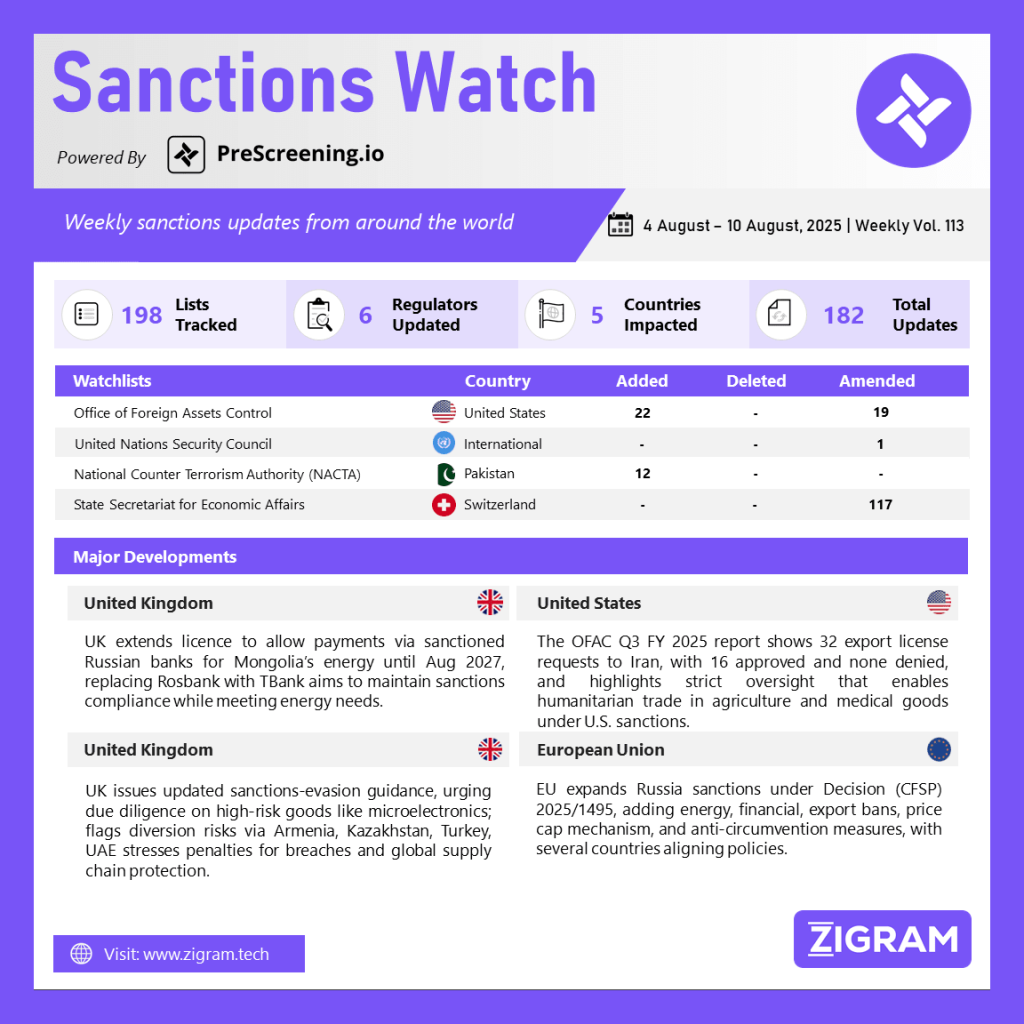Sanctions Watch Vol 113
In the latest edition of our Sanctions Watch weekly digest, we present significant updates on sanction watchlists and regulatory developments.
UK Extends Russia Sanctions General License for Mongolia Energy Payments Until 2027
The UK’s Office of Financial Sanctions Implementation (OFSI) has extended General Licence INT/2022/2085212, originally issued on 15 August 2022 under the Russia (Sanctions) (EU Exit) Regulations 2019. The licence permits payments to certain sanctioned Russian banks and their subsidiaries for the purpose of making energy available for use in Mongolia.
Initially covering Credit Bank of Moscow, Gazprombank, Sberbank, and Rosbank PJSC, the licence was amended on 24 March 2025 to remove Rosbank PJSC and add TBank to the list of sanctioned banks.
On 7 August 2025, the licence was extended by two years, with a new expiry date of 14 August 2027. The permissions allow individuals, institutions, and relevant entities to make payments and conduct necessary activities with sanctioned banks for the stated energy purpose. However, the licence does not authorise any action that would breach the Russia Regulations beyond its specific allowances.
The move ensures Mongolia’s energy needs can continue to be met while maintaining sanctions compliance.
OFAC Reports Q3 2025 Licensing Activities for Exports to Iran Under TSRA
The U.S. Department of the Treasury’s Office of Foreign Assets Control (OFAC) has released its Third Quarter Fiscal Year 2025 report covering licensing activities under the Trade Sanctions Reform and Export Enhancement Act of 2000 (TSRA) for the period from April to June 2025. Under Section 906(a)(1) of the TSRA, OFAC reviews and processes license applications for the export of agricultural commodities, medicine, and medical devices to Iran.
During this quarter, the Licensing Division received a total of 32 applications, comprising eight for agricultural commodities, one for medicine, and 23 for medical devices. OFAC issued 34 licensing determinations, which included 16 licenses seven for agricultural commodities, none for medicine, and nine for medical devices along with one license amendment related to medical devices, 11 return-without-action letters, and four general license guidance letters. Notably, there were no application denials in this period.
The report highlights OFAC’s ongoing efforts to uphold U.S. sanctions policy while ensuring compliance with humanitarian trade provisions. By authorizing certain exports under strict regulatory oversight, OFAC facilitates the lawful supply of essential goods to Iran, balancing sanctions enforcement with humanitarian considerations.
UK Government Issues Updated Guidance to Combat Russian Sanctions Evasion
The UK Department for Business & Trade, alongside the Office of Trade Sanctions Implementation (OTSI), released updated guidance to help businesses counter Russian sanctions evasion and circumvention. Since the invasion of Ukraine, the UK has enforced strict export controls targeting Russia’s access to advanced technologies and critical goods. However, Russia increasingly uses indirect supply routes, third-country intermediaries, and complex procurement chains to bypass restrictions.
The guidance outlines high-risk goods—including microelectronics, weapon components, industrial machinery, and advanced manufacturing tools—listed on the Common High Priority List (CHPL). It warns of red flags in transactions, such as unusual routing, opaque customer details, and mismatches in business activity.
Businesses are urged to perform enhanced due diligence, implement strategic risk assessments, and monitor for suspicious procurement cycles. The UK highlights the role of certain countries including Armenia, Kazakhstan, Turkey, and the UAE as potential hubs for diversion.
The document also provides resources, screening tools, and enforcement contacts, emphasizing the legal obligations for UK exporters and the severe penalties for breaches. HMRC and OTSI will continue to investigate violations, with a focus on preventing Russia from obtaining technology that could aid its military aggression.
This update reflects the UK’s ongoing commitment, alongside allies, to close loopholes in sanctions enforcement and protect global supply chains from being exploited by sanctioned entities.
EU Aligns Additional Countries with New Sanctions on Russia Over Ukraine Destabilization
The Council of the European Union adopted Council Decision (CFSP) 2025/1495, expanding restrictive measures against Russia in response to its actions destabilizing Ukraine. The decision introduces new prohibitions targeting Russia’s energy revenues, including a ban on purchasing, importing, or transferring petroleum products obtained in third countries from Russian crude oil, along with restrictions on related technical and financial assistance.
It establishes an automatic price cap adjustment mechanism for Russian crude oil, expands the prohibition on specialized financial messaging services into a full transaction ban (adding 22 more entities), and introduces a transaction ban on the Russian Direct Investment Fund. Additional export restrictions target items contributing to Russia’s military and defense capabilities, alongside measures to counter sanctions circumvention. Albania, Bosnia and Herzegovina, Iceland, Liechtenstein, Montenegro, North Macedonia, Norway, and Ukraine have aligned their national policies with this decision, a move welcomed by the EU.
Know more about the product: PreScreening.io
Click here to book a free demo.
Sanctions Watch is a weekly recap of events and news related to sanctions around the world.
- #RussiaSanctions
- #OFSI
- #MongoliaEnergy
- #OFAC
- #TSRA
- #IranTrade
- #SanctionsEvasion
- #EUforeignpolicy
- #UkraineConflict
- #GlobalTradeCompliance

